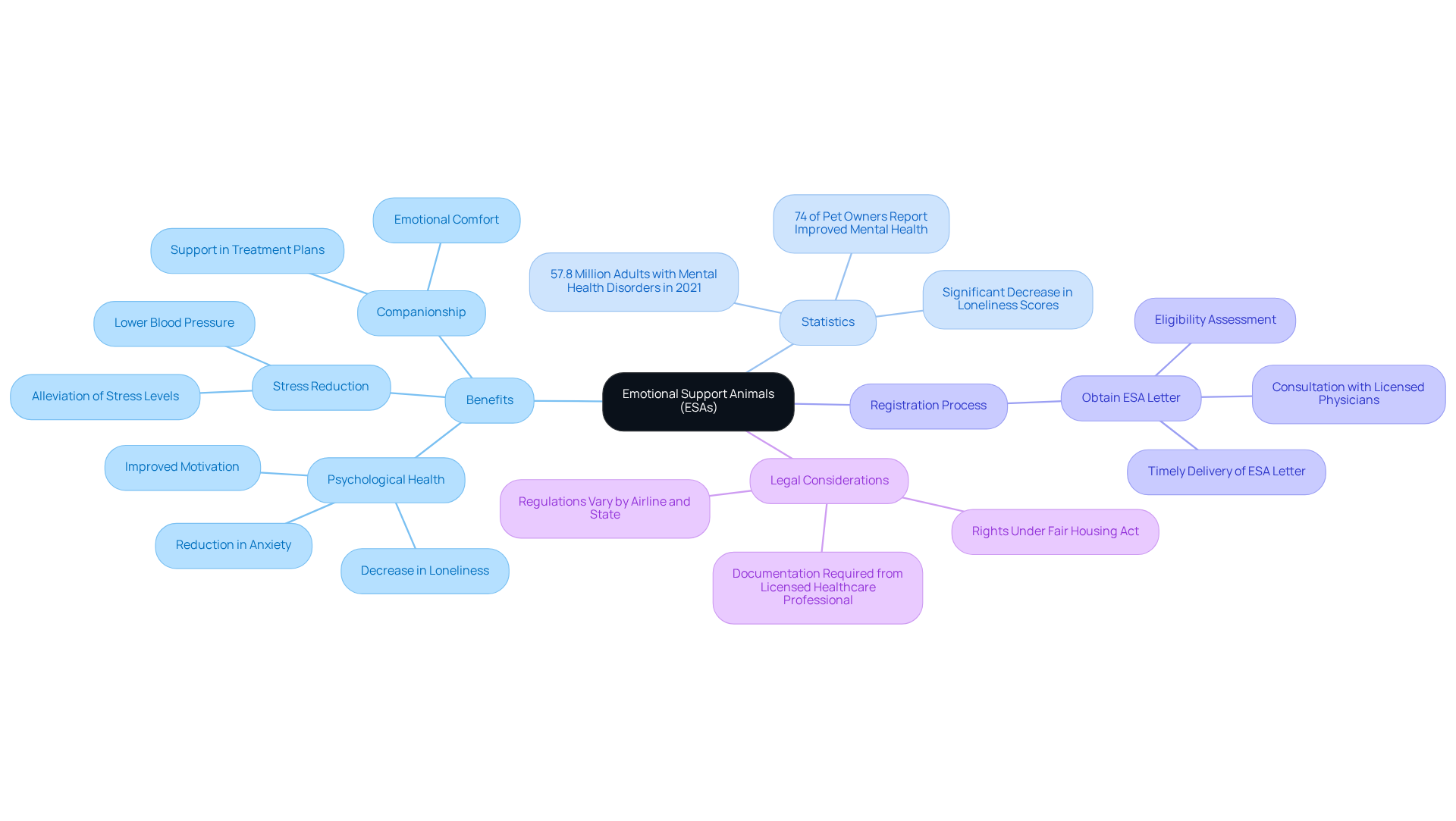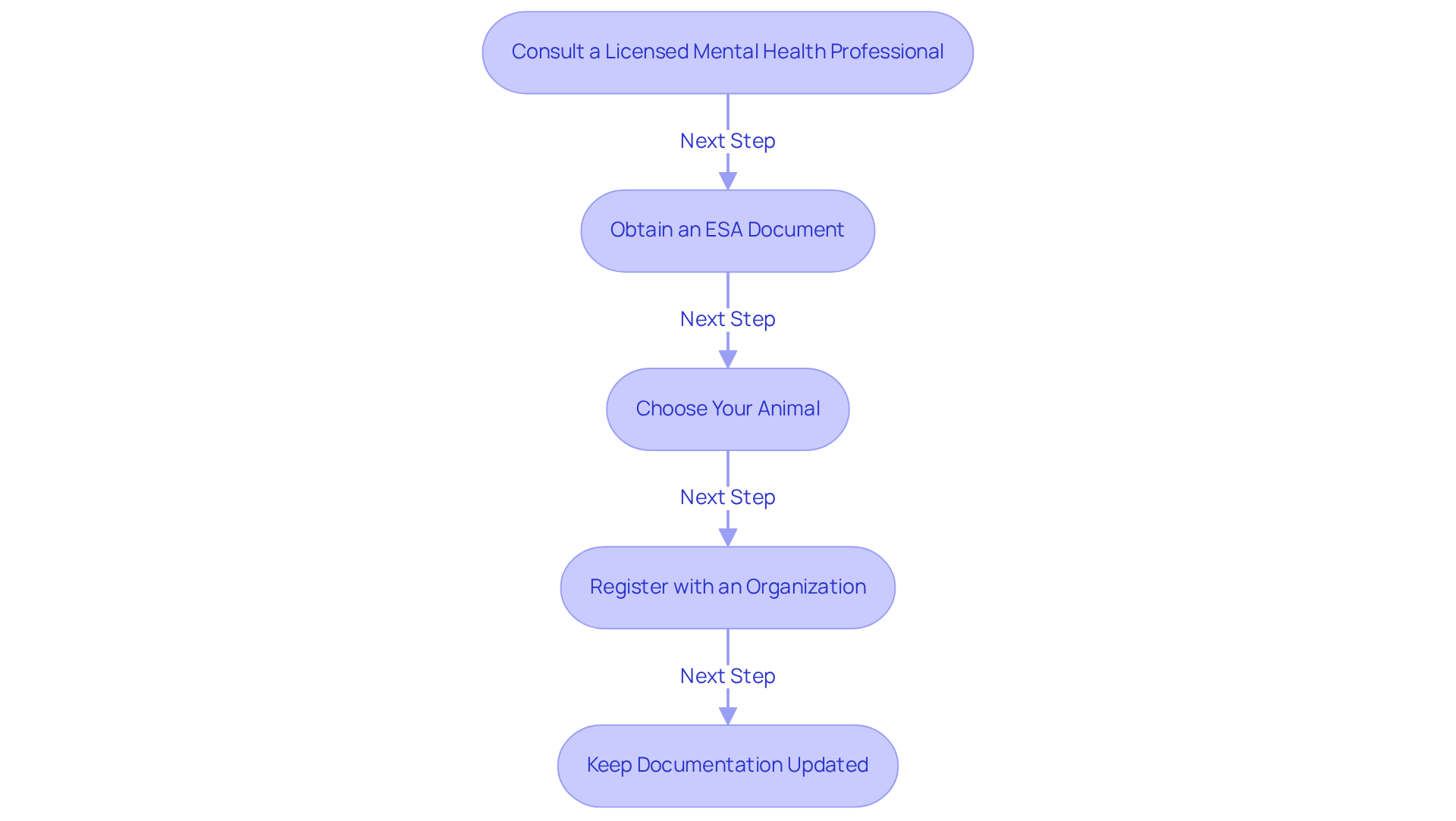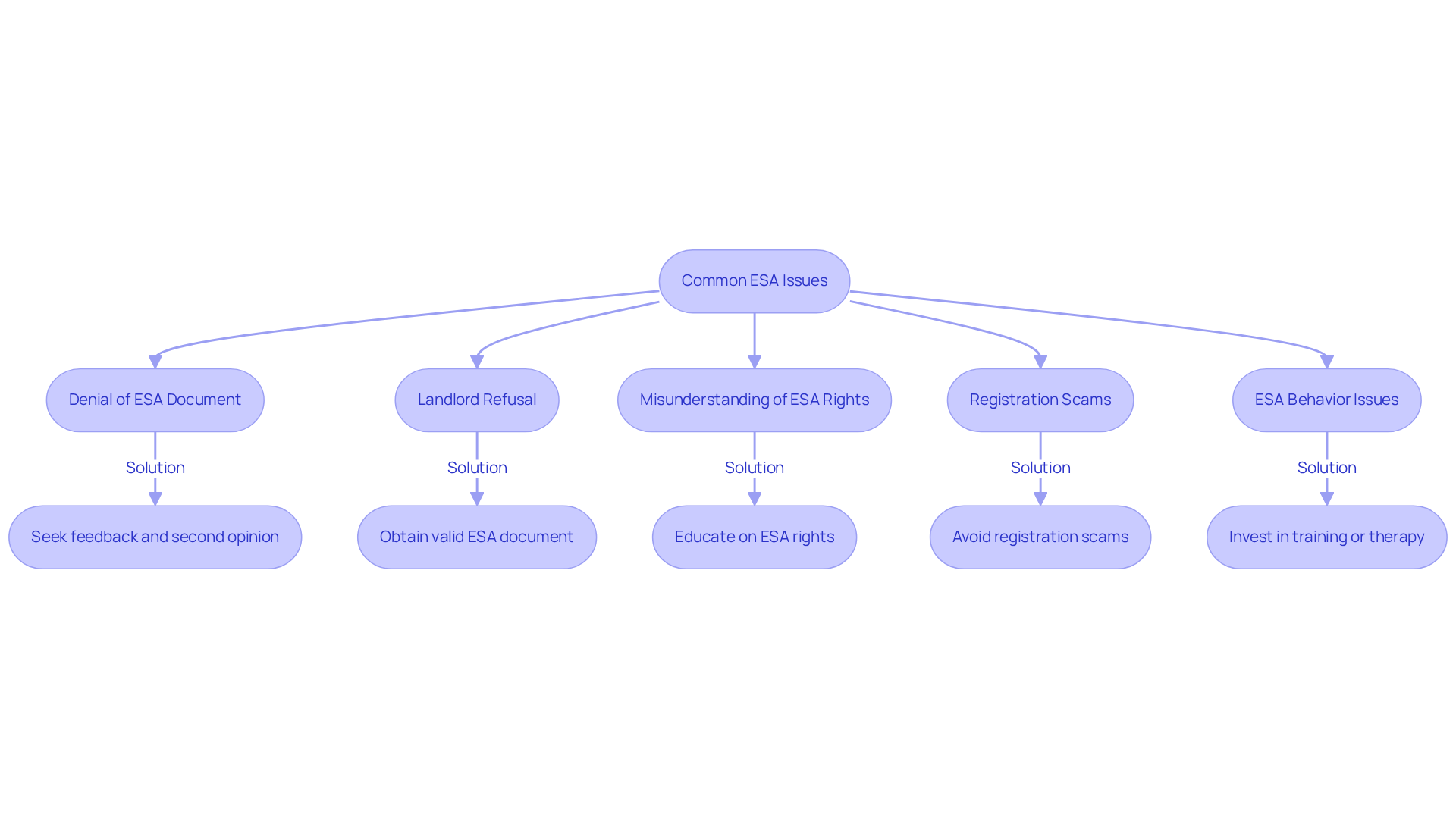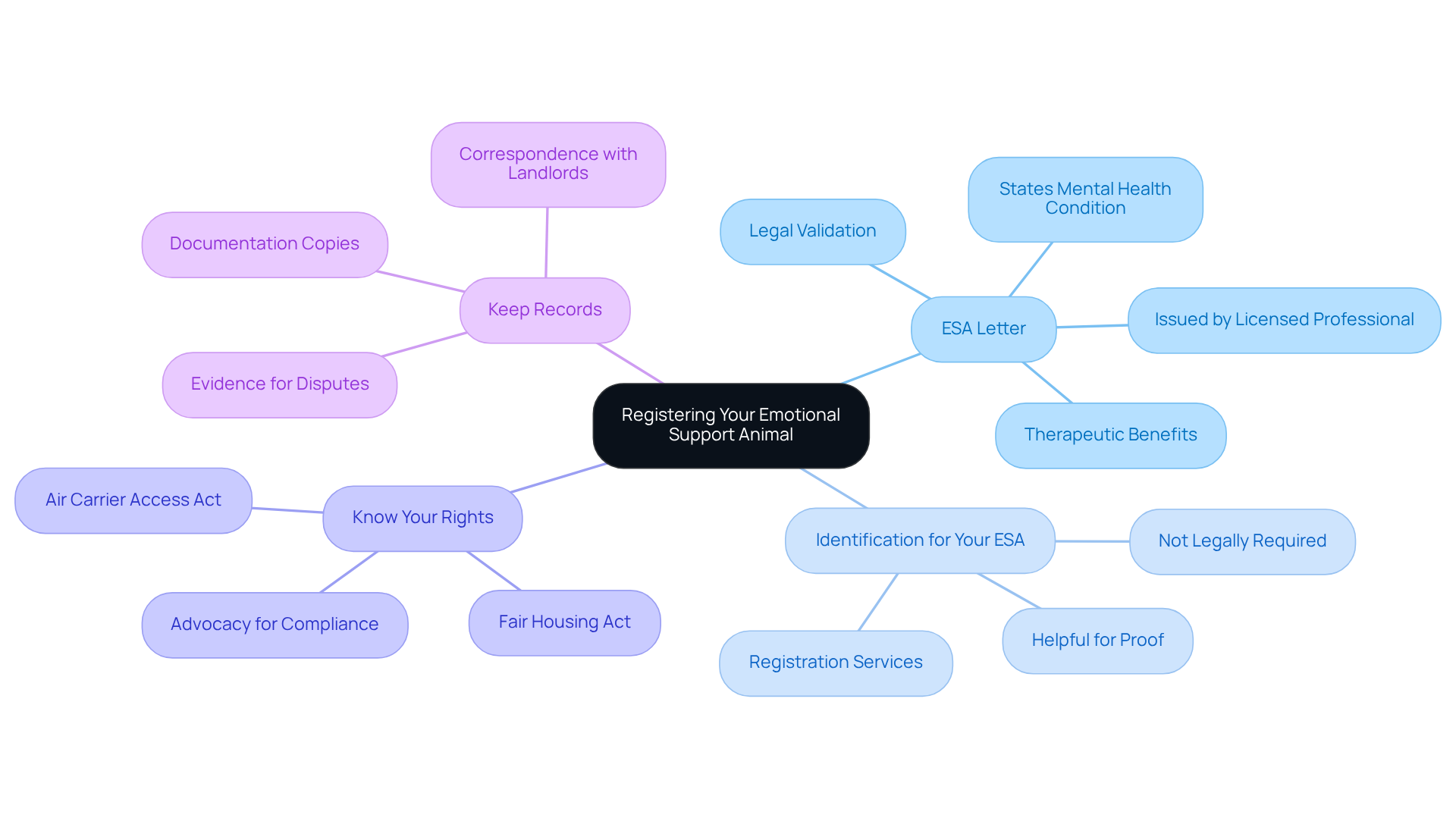

How to Register an Animal as an ESA: Step-by-Step Guide
by Lena Park
Last updated: July 19, 2025
Verified and Approved by:
Angela Morris,
MSW, LCSW
Fact Checked

Overview
Navigating the path to registering an animal as an Emotional Support Animal (ESA) can be a challenging journey for many individuals. It often begins with the need for emotional support, which is why consulting a licensed mental health professional is essential. They can provide an official ESA letter that confirms this need, offering a sense of validation and understanding.
This process involves:
- Obtaining the necessary documentation
- Selecting a suitable animal that can provide comfort and companionship
Furthermore, it’s important to understand your rights under laws like the Fair Housing Act, which protect your ability to have your ESA with you in housing and travel situations.
Remember, you are not alone in this journey, and there is support available to help you every step of the way.
Introduction
Emotional Support Animals (ESAs) have become essential companions for individuals grappling with emotional and psychological challenges, offering comfort and a sense of stability. It is important to understand the process of registering an animal as an ESA, especially for those looking to enhance their mental well-being through this unique form of companionship.
Yet, navigating the registration process can be daunting, bringing up concerns about:
- Legal rights
- Necessary documentation
- Potential obstacles one might face along the way
How can individuals ensure they successfully register their ESA and access the support they truly need? This journey can feel overwhelming, but it’s important to remember that help is available, and you are not alone in this process.
Understand Emotional Support Animals and Their Benefits
Emotional Support Animals serve as vital companions for individuals navigating emotional or psychological challenges. Unlike service animals, ESAs do not require specialized training; their primary role is to offer comfort and companionship. Research shows that the presence of an ESA can lead to meaningful improvements in psychological health, including reductions in anxiety and loneliness. For example, a study found a statistically significant decrease in loneliness scores after 12 months of interaction with an ESA, with participants expressing enhanced feelings of comfort and motivation to care for themselves.
The advantages of ESAs extend far beyond companionship. They have been shown to reduce blood pressure and alleviate stress levels, contributing to overall psychological well-being. In fact, nearly 74% of pet owners believe their mental health improved after welcoming a pet into their lives, highlighting the profound impact these animals can have on emotional stability. Mental health professionals emphasize the importance of ESAs in treatment plans, noting that they can enrich traditional therapies by providing emotional relief and support.
It is essential to recognize that emotional support animals do not possess the same legal rights and access to public spaces as service dogs under the ADA. Understanding how to register an animal as an ESA is crucial for those considering an ESA. Additionally, knowing how to register an animal as an ESA includes obtaining an ESA letter, which is a vital step in this journey, typically requiring a licensed health expert to assess the individual’s needs and provide the necessary documentation.
Recent research continues to affirm the effectiveness of animal-assisted therapies, revealing that individuals who engage with their pets experience noticeable improvements in psychological health indicators. This evidence underscores the crucial role ESAs play in fostering psychological well-being, particularly for those grappling with anxiety, depression, or loneliness. Therefore, understanding how to register an animal as an ESA is vital for individuals seeking therapeutic companionship during challenging times.

Follow the Step-by-Step Registration Process for Your ESA
-
Consult a Licensed Mental Health Professional: Begin your journey by scheduling an appointment with a licensed therapist or psychiatrist. During this consultation, it’s important to openly discuss your emotional well-being needs and how an Emotional Support Animal (ESA) could assist you. This step is vital, as a licensed expert must diagnose a qualifying condition to provide an ESA document, ensuring you receive the support you deserve.
-
Obtain an ESA Document: If the mental health professional concludes that an ESA could benefit you, they will provide you with an official ESA document. This document should be on their stationery, signed, and include their license number, which is essential for meeting legal requirements for housing and travel accommodations.
-
Choose Your Animal: Any domesticated animal can qualify as an ESA, but it’s crucial to select one that is well-behaved and capable of offering the emotional support you need. While dogs are the most common type of ESA, cats, rabbits, and even birds are increasingly recognized for their therapeutic benefits, each providing unique comfort.
To understand how to register an animal as an ESA, one should follow the necessary guidelines. Although registration isn’t legally required, many individuals choose to understand how to register an animal as an ESA with a reputable organization to obtain an ID card or certificate. This can be helpful in situations where proof of your ESA is necessary, such as in pet-restricted housing or during travel, offering you peace of mind.
- Keep Documentation Updated: Remember that ESA letters typically need to be renewed annually. Maintaining regular communication with your health professional is essential to ensure your documentation remains valid and current. This is crucial for accessing your rights under the Fair Housing Act and other regulations, allowing you to feel secure in your support.
Recent statistics reveal that around 200,000 ESAs are registered in the U.S., reflecting a growing recognition of their importance in emotional health support. Seeking guidance from a psychological health expert is vital, as 80% of ESA owners report significant improvements in their well-being. This highlights the therapeutic role these animals play in alleviating symptoms of anxiety, depression, and PTSD, reinforcing the idea that you are not alone in your journey.

Troubleshoot Common Issues in ESA Registration
-
Issue: Denial of ESA Document: If your mental health provider denies your request for an ESA document, it’s crucial to seek constructive feedback on their decision. With approximately 18% of pet owners in the U.S. having Emotional Support Animals (ESAs), many find their requests for ESA documentation rejected. Consider seeking a second opinion from another licensed expert; this can provide fresh perspectives and alternative pathways to obtaining your ESA document. Wellness Wag offers a supportive process where, after submitting the necessary forms, you can consult with a licensed medical doctor who will assess your eligibility for an ESA. Remember, persistence is key in this journey, and having a professionally crafted ESA document can significantly bolster your case.
-
Issue: Landlord Refusal: If your landlord refuses to accept your ESA, ensure you possess a valid ESA document. Familiarize yourself with the Fair Housing Act, which protects your right to have an ESA in housing situations. This important law mandates reasonable accommodations for individuals with certified emotional support animals, allowing you to live with your pet even in residences that typically restrict animals. Presenting clear documentation, such as the ESA letter obtained through Wellness Wag’s consultation service, is essential to support your case.
-
Issue: Misunderstanding of Emotional Support Animal Rights: It’s vital to educate yourself about your rights concerning emotional support animals. Many landlords and airlines may not fully understand the regulations surrounding ESAs. Having well-documented proof of your rights, including your ESA documentation, can help clarify your position and facilitate smoother interactions with property managers or airline representatives.
-
Issue: Registration Scams: Be cautious of websites that claim to register your ESA for a fee. There is no official registry for emotional support animals; the only required documentation is the letter issued by a licensed professional. Stay vigilant against scams that exploit the need for understanding how to register an animal as an ESA, as legitimate support comes from proper documentation rather than registration.
-
Issue: Emotional Support Animal Behavior: If your ESA exhibits problematic behavior, consider investing in training or behavioral therapy. This proactive approach ensures that your animal can provide the necessary support without adding stress to your situation. Proper training can enhance the bond between you and your ESA, making your companionship even more beneficial. Additionally, ESAs are known to offer comfort and support, especially for vulnerable groups facing social isolation, underscoring the importance of their well-being.

Gather Required Documentation and Know Your Rights
To successfully register your Emotional Support Animal (ESA) and ensure you can benefit from their support in housing and travel, it’s important to gather the following documentation:
-
ESA Letter: This is the most critical document. It must be issued by a licensed mental health professional and should clearly state that you have a mental health condition and that the ESA provides therapeutic benefits. This document is essential for validating your need for an ESA and provides information on how to register an animal as an esa under the Fair Housing Act and the Air Carrier Access Act.
-
Identification for Your ESA: While not legally required, having an ID card for your ESA can be beneficial in situations where proof is needed. Some organizations provide information on how to register an animal as an esa, offering registration services that include ID cards to help advocate for your rights.
-
Know Your Rights: Familiarize yourself with the Fair Housing Act and the Air Carrier Access Act, which protect your rights to have an ESA in housing and during air travel. Understanding these laws will empower you to advocate effectively for your rights and ensure compliance from landlords and airlines, especially in the context of how to register an animal as an esa.
-
Keep Records: Maintain copies of all documentation related to your ESA, including the ESA letter and any correspondence with landlords or airlines. This will be invaluable if any disputes arise regarding your ESA’s status, ensuring you have the necessary evidence to support your case.

Conclusion
Emotional Support Animals (ESAs) play a vital role in enhancing the emotional and psychological well-being of individuals facing various mental health challenges. The journey of registering an animal as an ESA may feel overwhelming, yet grasping the necessary steps and legal requirements can empower individuals to secure the companionship that significantly enhances their quality of life.
Throughout this guide, we have highlighted key points, such as:
- The importance of consulting a licensed mental health professional
- Obtaining an official ESA letter
- Keeping documentation current
Additionally, we have provided insights into common hurdles encountered during the registration process, like landlord refusals and understanding rights under the Fair Housing Act, offering a comprehensive overview of what to expect when registering an ESA. The benefits of having an ESA, including reduced anxiety and enhanced emotional support, underscore the value of this journey.
Ultimately, the significance of Emotional Support Animals cannot be overstated. They offer crucial comfort and companionship, particularly for those navigating emotional distress. By following the outlined steps and remaining informed about your rights and responsibilities, you can navigate the registration process with confidence. Embracing the support of an ESA not only nurtures personal well-being but also fosters a deeper connection with a beloved animal companion, paving the way for a more fulfilling life.
Frequently Asked Questions
What is an Emotional Support Animal (ESA)?
An Emotional Support Animal (ESA) is a companion animal that provides comfort and support to individuals facing emotional or psychological challenges. Unlike service animals, ESAs do not require specialized training.
What are the benefits of having an ESA?
The presence of an ESA can lead to significant improvements in psychological health, including reductions in anxiety and loneliness. They can also help lower blood pressure and alleviate stress levels, contributing to overall well-being.
How do ESAs differ from service animals?
ESAs do not have the same legal rights and access to public spaces as service dogs under the Americans with Disabilities Act (ADA). Their primary role is to offer emotional comfort rather than perform specific tasks.
How can one register an animal as an ESA?
To register an animal as an ESA, individuals must obtain an ESA letter from a licensed health expert who assesses their needs and provides the necessary documentation.
What role do ESAs play in mental health treatment?
Mental health professionals recognize ESAs as valuable components of treatment plans, as they can enhance traditional therapies by providing emotional relief and support.
What does research say about the effectiveness of ESAs?
Research indicates that individuals who interact with ESAs experience noticeable improvements in psychological health indicators, reinforcing the positive impact of these animals on emotional stability.
How many pet owners believe their mental health improved after getting a pet?
Nearly 74% of pet owners believe their mental health improved after welcoming a pet into their lives, highlighting the significant benefits of having an ESA.
Certify Your Emotional Support Animal Today

Why You Can Rely on Us?
At Wellness Wag, we believe your pet deserves care rooted in both science and compassion. Each article is carefully researched, written in clear language for pet owners, and then reviewed by qualified professionals to ensure the information is evidence-based, current, and practical for real-life care. Our goal is to help you feel confident in making informed decisions about your pet’s health and well-being.
Reviewed by
Angela Morris, MSW, LCSW
Angela is a licensed clinical social worker with 20 years of experience in patient advocacy and community mental health. She has assisted numerous clients with ESA evaluations and brings a deep understanding of disability accommodations, ensuring that all information is accurate, supportive, and practical.

Written by :
Lena Park
Last Updated :
July 19, 2025












